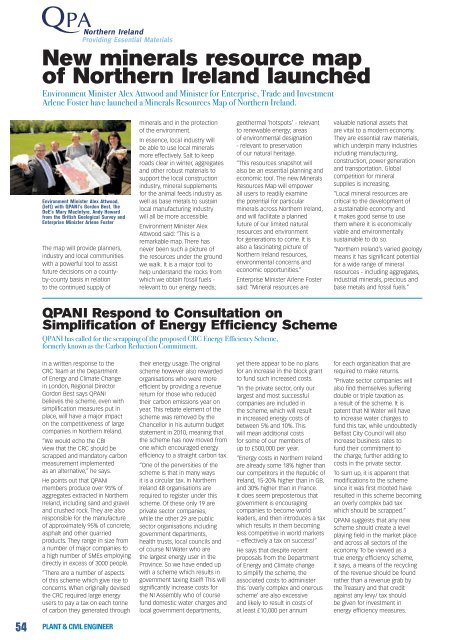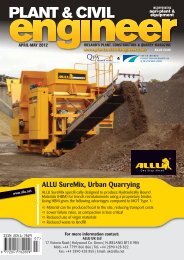CAT Finning FC fp ad.indd - Plant & Civil Engineer
CAT Finning FC fp ad.indd - Plant & Civil Engineer
CAT Finning FC fp ad.indd - Plant & Civil Engineer
You also want an ePaper? Increase the reach of your titles
YUMPU automatically turns print PDFs into web optimized ePapers that Google loves.
54 <strong>Plant</strong> & <strong>Civil</strong> EnginEER<br />
Northern Ireland<br />
Providing Essential Materials<br />
New minerals resource map<br />
of Northern Ireland launched<br />
Environment Minister Alex Attwood and Minister for Enterprise, Tr<strong>ad</strong>e and Investment<br />
Arlene Foster have launched a Minerals Resources Map of Northern Ireland.<br />
Environment Minister Alex Attwood,<br />
(left) with QPANI’s Gordon Best, the<br />
DoE’s Mary MacIntyre, Andy Howard<br />
from the British Geological Survey and<br />
Enterprise Minister Arlene Foster<br />
The map will provide planners,<br />
industry and local communities<br />
with a powerful tool to assist<br />
future decisions on a countyby-county<br />
basis in relation<br />
to the continued supply of<br />
minerals and in the protection<br />
of the environment.<br />
In essence, local industry will<br />
be able to use local minerals<br />
more effectively. Salt to keep<br />
ro<strong>ad</strong>s clear in winter, aggregates<br />
and other robust materials to<br />
support the local construction<br />
industry, mineral supplements<br />
for the animal feeds industry as<br />
well as base metals to sustain<br />
local manufacturing industry<br />
will all be more accessible.<br />
Environment Minister Alex<br />
Attwood said: “This is a<br />
remarkable map. There has<br />
never been such a picture of<br />
the resources under the ground<br />
we walk. It is a major tool to<br />
help understand the rocks from<br />
which we obtain fossil fuels -<br />
relevant to our energy needs;<br />
geothermal ‘hotspots’ - relevant<br />
to renewable energy; areas<br />
of environmental designation<br />
- relevant to preservation<br />
of our natural heritage.<br />
“This resources snapshot will<br />
also be an essential planning and<br />
economic tool. The new Minerals<br />
Resources Map will empower<br />
all users to re<strong>ad</strong>ily examine<br />
the potential for particular<br />
minerals across Northern Ireland,<br />
and will facilitate a planned<br />
future of our limited natural<br />
resources and environment<br />
for generations to come. It is<br />
also a fascinating picture of<br />
Northern Ireland resources,<br />
environmental concerns and<br />
economic opportunities.”<br />
Enterprise Minister Arlene Foster<br />
said: “Mineral resources are<br />
QPANI Respond to Consultation on<br />
Simplification of Energy Efficiency Scheme<br />
QPANI has called for the scrapping of the proposed CRC Energy Efficiency Scheme,<br />
formerly known as the Carbon Reduction Commitment.<br />
In a written response to the<br />
CRC Team at the Department<br />
of Energy and Climate Change<br />
in London, Regional Director<br />
Gordon Best says QPANI<br />
believes the scheme, even with<br />
simplification measures put in<br />
place, will have a major impact<br />
on the competitiveness of large<br />
companies in Northern Ireland.<br />
“We would echo the CBI<br />
view that the CRC should be<br />
scrapped and mandatory carbon<br />
measurement implemented<br />
as an alternative,” he says.<br />
He points out that QPANI<br />
members produce over 95% of<br />
aggregates extracted in Northern<br />
Ireland, including sand and gravel<br />
and crushed rock. They are also<br />
responsible for the manufacture<br />
of approximately 95% of concrete,<br />
asphalt and other quarried<br />
products. They range in size from<br />
a number of major companies to<br />
a high number of SMEs employing<br />
directly in excess of 3000 people.<br />
“There are a number of aspects<br />
of this scheme which give rise to<br />
concerns. When originally devised<br />
the CRC required large energy<br />
users to pay a tax on each tonne<br />
of carbon they generated through<br />
their energy usage. The original<br />
scheme however also rewarded<br />
organisations who were more<br />
efficient by providing a revenue<br />
return for those who reduced<br />
their carbon emissions year on<br />
year. This rebate element of the<br />
scheme was removed by the<br />
Chancellor in his autumn budget<br />
statement in 2010, meaning that<br />
the scheme has now moved from<br />
one which encouraged energy<br />
efficiency to a straight carbon tax.<br />
“One of the perversities of the<br />
scheme is that in many ways<br />
it is a circular tax. In Northern<br />
Ireland 48 organisations are<br />
required to register under this<br />
scheme. Of these only 19 are<br />
private sector companies,<br />
while the other 29 are public<br />
sector organisations including<br />
government departments,<br />
health trusts, local councils and<br />
of course NI Water who are<br />
the largest energy user in the<br />
Province. So we have ended up<br />
with a scheme which results in<br />
government taxing itself! This will<br />
significantly increase costs for<br />
the NI Assembly who of course<br />
fund domestic water charges and<br />
local government departments,<br />
yet there appear to be no plans<br />
for an increase in the block grant<br />
to fund such increased costs.<br />
“In the private sector, only our<br />
largest and most successful<br />
companies are included in<br />
the scheme, which will result<br />
in increased energy costs of<br />
between 5% and 10%. This<br />
will mean <strong>ad</strong>ditional costs<br />
for some of our members of<br />
up to £500,000 per year.<br />
“Energy costs in Northern Ireland<br />
are alre<strong>ad</strong>y some 18% higher than<br />
our competitors in the Republic of<br />
Ireland, 15-20% higher than in GB,<br />
and 30% higher than in France.<br />
It does seem preposterous that<br />
government is encouraging<br />
companies to become world<br />
le<strong>ad</strong>ers, and then introduces a tax<br />
which results in them becoming<br />
less competitive in world markets<br />
– effectively a tax on success!”<br />
He says that despite recent<br />
proposals from the Department<br />
of Energy and Climate change<br />
to simplify the scheme, the<br />
associated costs to <strong>ad</strong>minister<br />
this ‘overly complex and onerous<br />
scheme’ are also excessive<br />
and likely to result in costs of<br />
at least £10,000 per annum<br />
valuable national assets that<br />
are vital to a modern economy.<br />
They are essential raw materials,<br />
which underpin many industries<br />
including manufacturing,<br />
construction, power generation<br />
and transportation. Global<br />
competition for mineral<br />
supplies is increasing.<br />
“Local mineral resources are<br />
critical to the development of<br />
a sustainable economy and<br />
it makes good sense to use<br />
them where it is economically<br />
viable and environmentally<br />
sustainable to do so.<br />
“Northern Ireland’s varied geology<br />
means it has significant potential<br />
for a wide range of mineral<br />
resources - including aggregates,<br />
industrial minerals, precious and<br />
base metals and fossil fuels.”<br />
for each organisation that are<br />
required to make returns.<br />
“Private sector companies will<br />
also find themselves suffering<br />
double or triple taxation as<br />
a result of the scheme. It is<br />
patent that NI Water will have<br />
to increase water charges to<br />
fund this tax, while undoubtedly<br />
Belfast City Council will also<br />
increase business rates to<br />
fund their commitment to<br />
the charge, further <strong>ad</strong>ding to<br />
costs in the private sector.<br />
To sum up, it is apparent that<br />
modifications to the scheme<br />
since it was first mooted have<br />
resulted in this scheme becoming<br />
an overly complex b<strong>ad</strong> tax<br />
which should be scrapped.”<br />
QPANI suggests that any new<br />
scheme should create a level<br />
playing field in the market place<br />
and across all sectors of the<br />
economy. To be viewed as a<br />
true energy efficiency scheme,<br />
it says, a means of the recycling<br />
of the revenue should be found<br />
rather than a revenue grab by<br />
the Treasury and that credit<br />
against any levy/ tax should<br />
be given for investment in<br />
energy efficiency measures.<br />
QPANI News Spre<strong>ad</strong>.<strong>indd</strong> 54 18/07/2012 14:26




